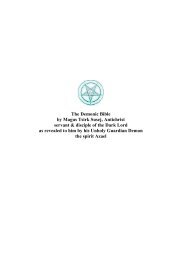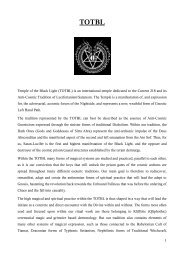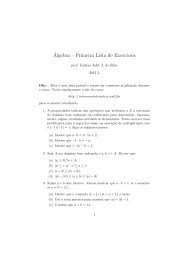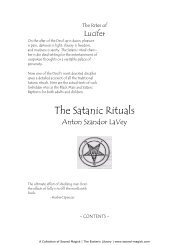I. VAMA MARGA Foundations Of The Left-Hand Path - staticfly.net
I. VAMA MARGA Foundations Of The Left-Hand Path - staticfly.net
I. VAMA MARGA Foundations Of The Left-Hand Path - staticfly.net
You also want an ePaper? Increase the reach of your titles
YUMPU automatically turns print PDFs into web optimized ePapers that Google loves.
inverted. <strong>The</strong> master was seen to serve the slave, and was even obliged to<br />
tolerate being beaten by his servant as long as the festival lasted.<br />
<strong>The</strong> Saturnalia was celebrated during the same time of year during<br />
which the modern Western world celebrates its Christmas holiday. If one<br />
ignores the barely acknowledged overlay of Christian myth that surrounds the<br />
Yule season today, one can still recognize an extremely watered down<br />
continuance of the Saturnalian tradition at the contemporary secular<br />
Christmas party, with its official toleration of seasonal drunkenness,<br />
mandatory smooching under the mistletoe (a plant strongly associated with<br />
the disobedient trickster Loki of Nordic lore), temporary indulgence of<br />
adulterous sexuality, and general mood of relative erotic license. Again, one<br />
notes that this temporary sexual freedom is actually a manifestation of social<br />
control, briefly freeing its grip before clamping down for the rest of the year.<br />
<strong>The</strong> left-hand path magician, by contrast, has stepped permanently<br />
outside of the social stream, and does not operate in the mandatory and<br />
obligatory nature of the ancient orgiastic festivals, or the contemporary<br />
Christianized holidays that perform a similar function. <strong>The</strong> magic of Eros that<br />
can be so energetically channeled through the orgy of the sinister current is<br />
not directed to making restraint and routine more bearable; it is applied<br />
instead to deeply personal ends, utterly separated from the demands of social<br />
control.<br />
Lupercalia<br />
Just as many familiar elements of the Saturnalia orgy live on in the Christmas<br />
celebration, a dim echo of the savagely sadomasochistic Roman Lupercalia<br />
festival – observed in ancient Rome and her colonies on February 14 – can<br />
still be detected in the modern world's rather more benign St. Valentine's<br />
Day. For the Romans, February was designated as a month of purification, a<br />
religious concept closely connected to the Greek "purge". It must be<br />
understood that the ancient concept of purification has little to do with the<br />
more recent Christian idea of casting out sin. It was instead intended to<br />
magically invigorate the carnal sphere of existence which can so easily<br />
become enfeebled.<br />
During the Lupercalia, the practically naked boys and young men of<br />
the town were given license to roam the streets dressed in wolf skins<br />
(alternately goat skins, in some regions of the empire), brandishing leather<br />
straps. Essentially, the celebrants took on the predatory nature of the wolf,<br />
hunting the girls of the town, who had to submit by exposing their flesh to be<br />
401<br />
flagellated by the leather thongs. Despite the violent nature of this festival,<br />
this mock hunt was apparently regarded as a pleasant diversion; the Roman<br />
historian Livy described the Lupercalia as being conducted "per ludum et<br />
lasciviam" (for fun and in a lascivious manner).<br />
<strong>The</strong> exact origin of the name Lupercalia is lost in the ancient pre-<br />
Roman Etruscan genesis of the rites. It's generally presumed that there is a<br />
connection to the patroness of the Roman state, the she-wolf Lupa, honored<br />
as the goddess Luperca Dea who suckled the heroic founders of Rome,<br />
Romulus and Remus. Considering the role that sacred whoredom plays in the<br />
left-hand path veneration of the Feminine Daemonic, it is interesting that the<br />
Sabine word lupa was also used to affectionately describe the harlots of<br />
Rome.<br />
According to the erudite werewolf expert Robert Eisler, in his<br />
essential 1948 study Man Into Wolf, Luperca is connected to the Greek word<br />
meaning "who acts as a wolf", or a werewolf. Eisler also explains that the<br />
word lup-erca is related to the Greek word ergon (action), and thus to the<br />
"meaning 'act', cf. orgia for the ritual actions in the mysteries." It would seem<br />
that the lycanthropic goddess Lupa, with her association with harlotry,<br />
predation and the orgy is an ideal divinity to invoke or evoke during magical<br />
workings that draw on such energies. For female magicians especially, Lupa
















